SEO salaries in 2025: Survey insights on how much SEO specialists really earn
It’s 2025, and with the rise of generative search, SEOs are stepping into roles that didn’t even exist a few years ago. But has their pay kept up?
We ran a survey to find out how much SEO professionals are making in 2025. The results show that things like experience, company type, location, and the scope of responsibilities have a big impact on the SEO paycheck.
Let’s dive into the numbers.
-
The median global salary of SEO specialists is $51,680.
Over half of the specialists earn between $30,000 and $75,000 per year, while only 5% earn over $150,000.
-
SEO professionals in the U.S. earn approximately 60% more than those in the EU.
The median salary in the U.S. is $66,000, compared to $40,689 in the European region.
-
Usually, SEO salaries rise with experience, but not always in a straight line.
Seniors earn a higher median pay ($60,160) than SEO Leads ($51,680), while Heads of SEO and business owners earn the highest median earnings at $75,000 and $130,000, respectively.
-
SEOs working in-house earn an average of $53,100, compared to $50,000 at digital marketing agencies.
At the same time, agency SEOs regularly experience more stress and less job satisfaction than others in the field.
-
Globally, 64.5% of SEO professionals received a salary raise in the last year.
Almost half of SEO specialists received raises of up to 10%. Interestingly, none received a raise of more than 30%.
-
Only 27% of SEOs believe their salary is competitive.
Overall, the majority of SEO professionals are unsure or dissatisfied with their compensation.
-
SEO managers earn 41.5% more on average than specialists without leadership roles.
Yet, they’re also 5.5 times more likely to work 50+ hours and experience higher stress levels.
-
High earners are more involved in SEO strategy, consulting, and analytics.
These tasks seem more valued in terms of pay than general execution-based SEO roles.
Salary survey overview: Participants, methodology, and more
This SEO salary analysis is based on a total of 279 survey responses collected from professionals across various regions and experience levels. The goal was to gain insight into compensation trends across different roles, locations, and seniority levels in 2025.
To better understand the profile of SEO professionals represented in this analysis, here’s a breakdown of who took part in the survey:
- 81.5% of respondents are employed, while the remaining 18.5% work as freelancers.
- 61.2% work full-time, typically between 35–40 hours per week.
- The most common areas of specialization include general SEO (73.4%), SEO strategy and management (62.3%), and technical SEO (58.7%).
- A significant portion of respondents (67%) reported having management responsibilities, highlighting the seniority of many participants.
For accurate regional comparisons, only well-represented areas were included: the United States, the European Union (EU), and the United Kingdom & Ireland. Regions with fewer responses (like Canada, Australia, and New Zealand) were included in global stats but excluded from detailed breakdowns. Limited data from C-level and intern/trainee roles were also excluded from experience-level analysis to maintain reliability.
Disclaimer: We collected 279 survey responses in total. While it’s a modest sample, we believe the results still provide valuable insights into global SEO salaries and the factors that influence them.
What is the median SEO salary?
Let’s start with the basics: the median salary for SEO specialists in 2025 worldwide is $51,680. But to really understand what SEO professionals earn, we need to look at their salary breakdown by range:
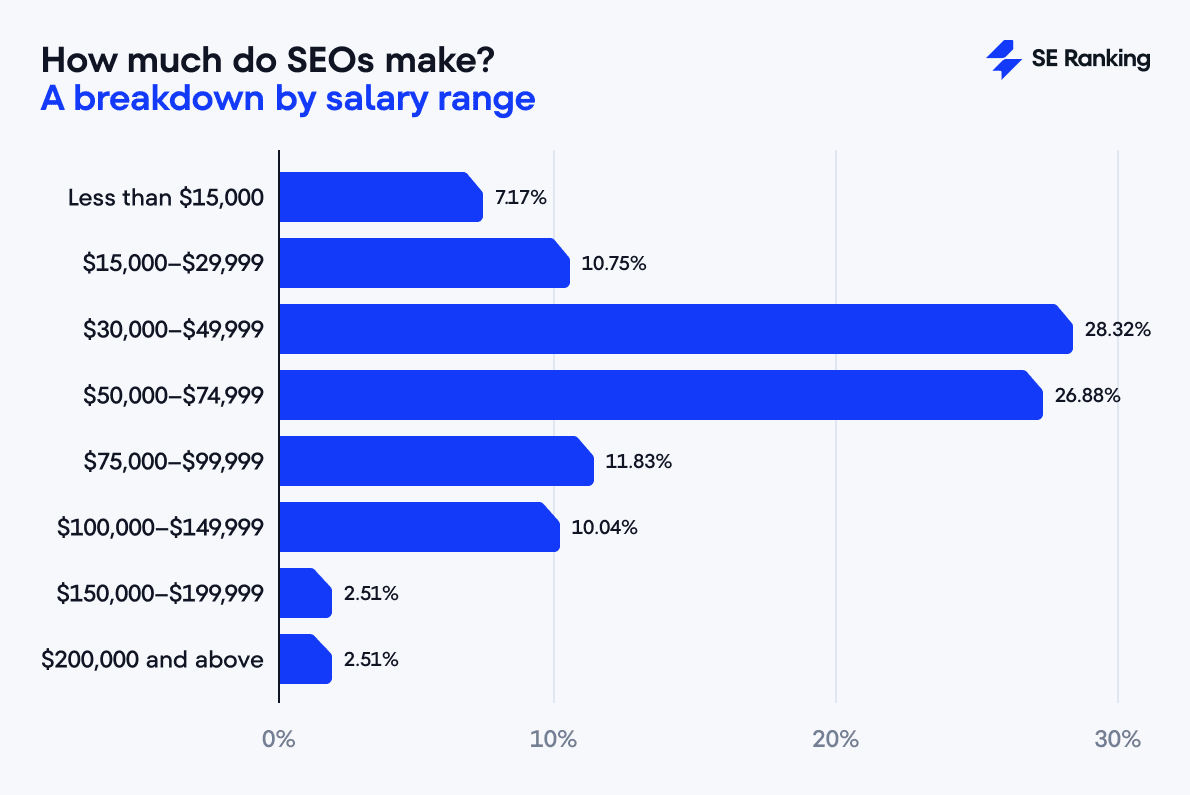
As you can see, over one half of all SEO professionals (55%) fall within the $30,000–$75,000 range.
At the high end, only 5% of SEO professionals earn over $150,000, which helps explain why the average salary ($66,340) is notably higher than the median. A few top earners are pulling the average up, but for most, salaries remain within a more modest and predictable range.
SEO salaries by region
If there’s one factor that consistently defines salary potential in SEO, it’s location.
Here are the median salaries across major regions:
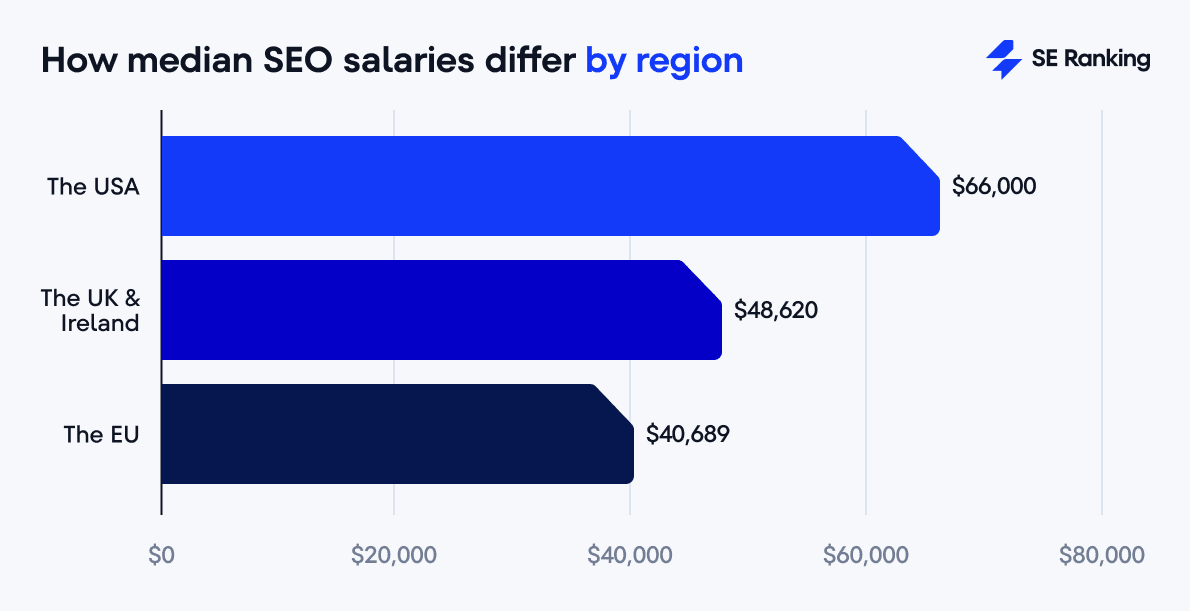
SEO professionals in the U.S. enjoy a significantly higher median salary of $66,000, placing them well above their EU counterparts. In comparison, the median salary in the EU stands at $40,689, which is 21% below the global average. The UK and Ireland offer slightly higher compensation, with a median salary of $48,620, yet still notably behind the U.S.
Simply put, where you live dramatically affects what your SEO skills are worth.
SEO salaries by experience level
It’s logical to assume that the more senior your role in SEO, the higher your earnings. And overall, this is true.
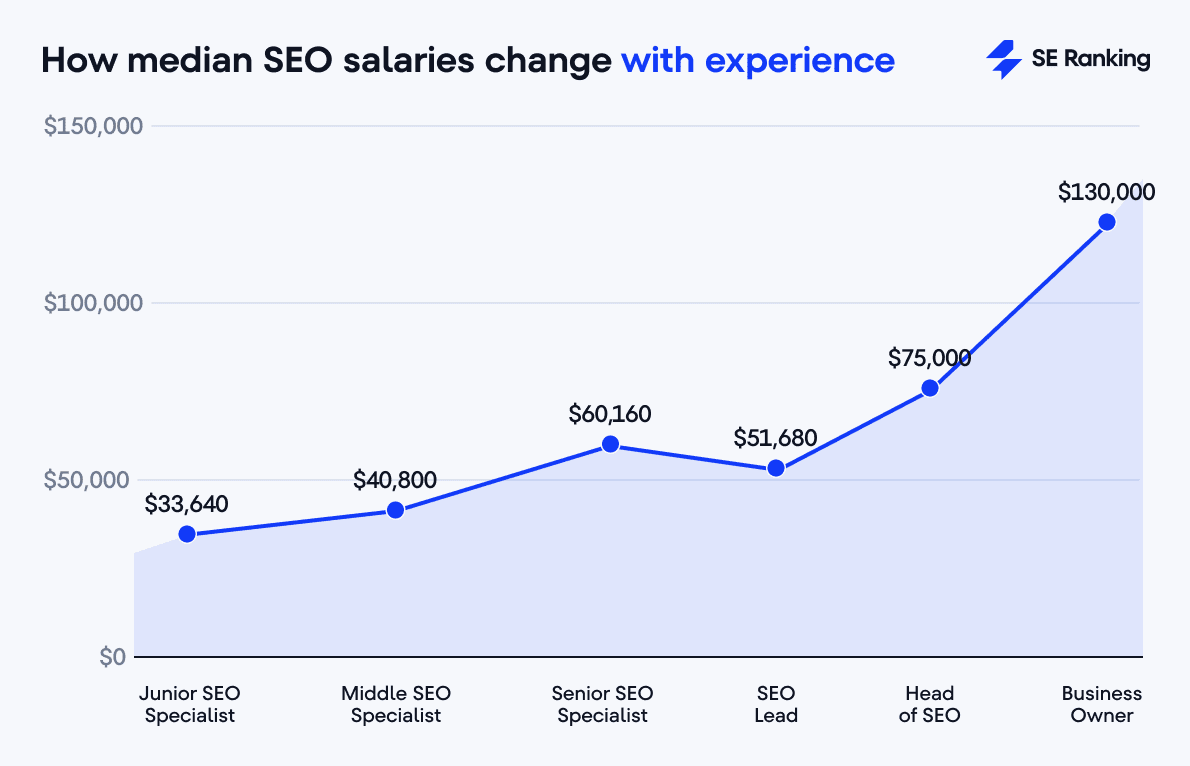
But when you look closely at the data, things get a bit more complex. For example, senior specialists earn more than SEO leads: their median salary is $60,160, while leads earn $51,680. That’s not the usual pattern you’d expect and creates a kind of “inverted” pay structure.
At higher levels, the trend becomes more predictable. Heads of SEO earn $75,000, and business owners top the chart with $130,000. So yes, more experience generally leads to higher pay.
Still, location also plays a big role. Two SEOs with the same level of experience can earn very different salaries depending on where they live and work.
For instance, for mid-level SEO professionals, the U.S. offers the highest median salary at $63,000, compared to $40,800 in the UK & Ireland and $37,700 in the EU.
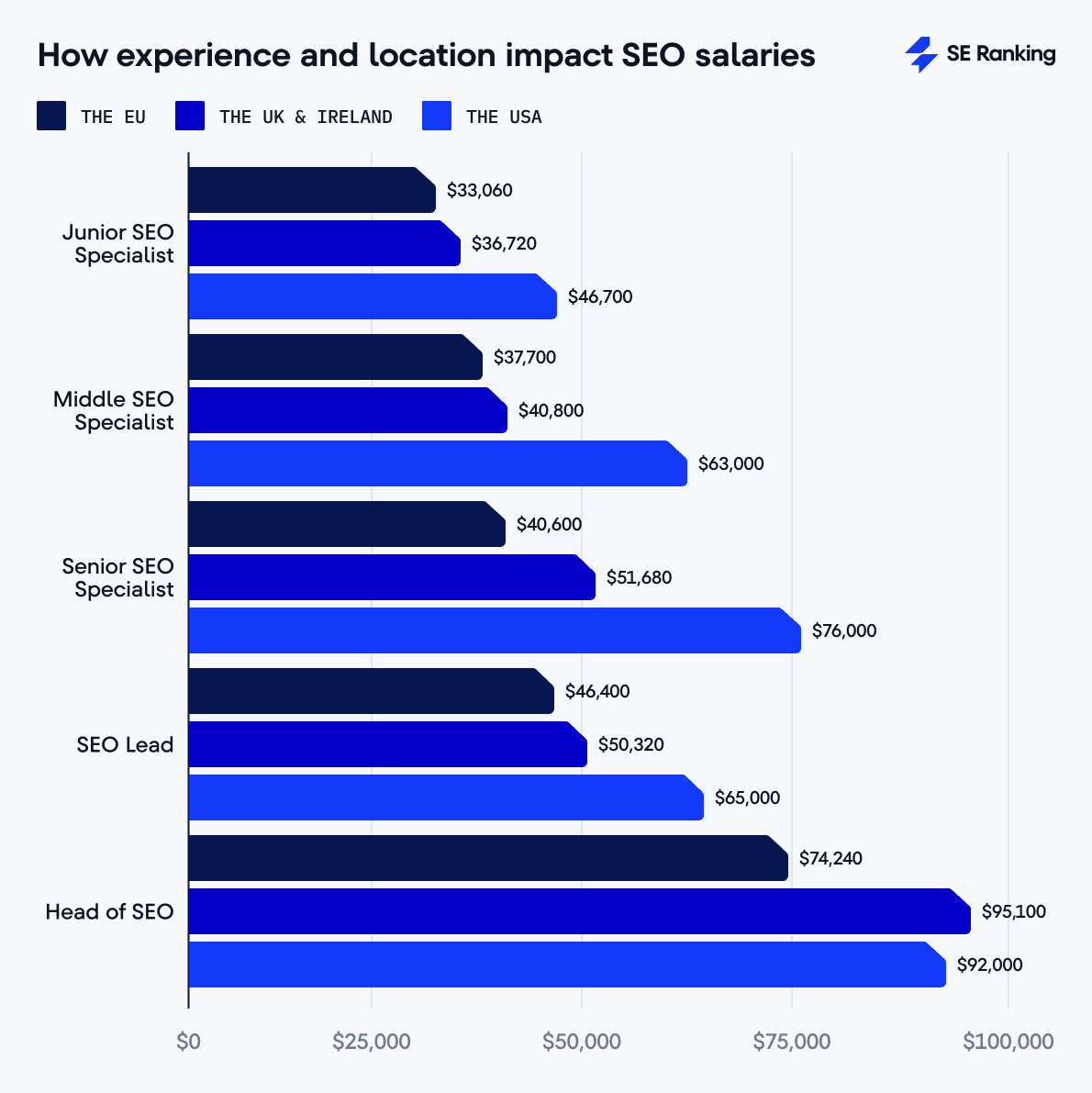
At the senior level, the gap persists: U.S. professionals earn $76,000, while UK & Ireland specialists earn $51,680, and EU seniors average $40,600.
As you can see, the EU is the only region where each successive experience level comes with a higher salary than the previous one. In other regions, SEO leads are clearly undervalued, earning less than lower-level specialists.
SEO salaries by employment type
Salaries also differ depending on the employer’s business model:
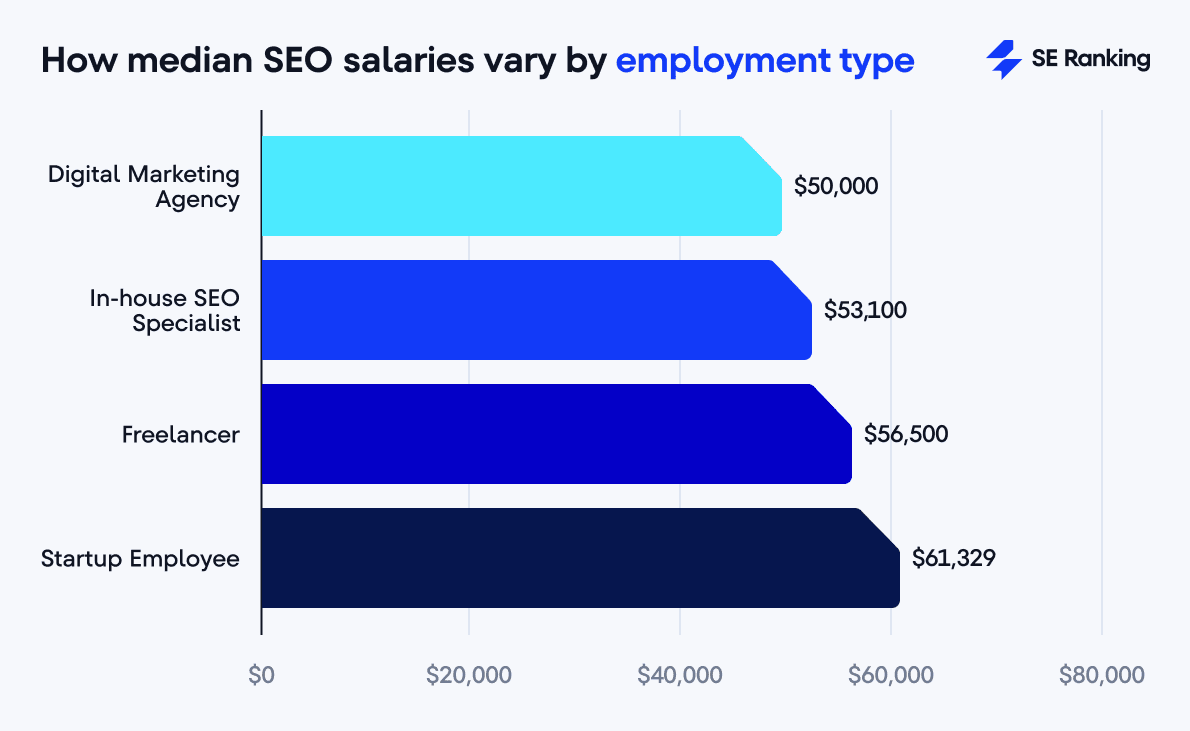
Startups offer the highest median salary of $61,329, possibly due to lean teams and the need for generalist talent.
In-house SEO roles provide a moderate median salary of $53,100, while agencies lag behind with the lowest median pay at $50,000. Although the salary differences aren’t dramatic, agency SEOs consistently report lower job satisfaction (3.35 vs. 3.44 for in-house SEOs) and higher stress levels (3.4 vs. 3.0 for in-house).
How much do SEO salaries increase annually?
Overall, 64.5% of SEO professionals globally received a raise last year. Here’s how that varies between regions:
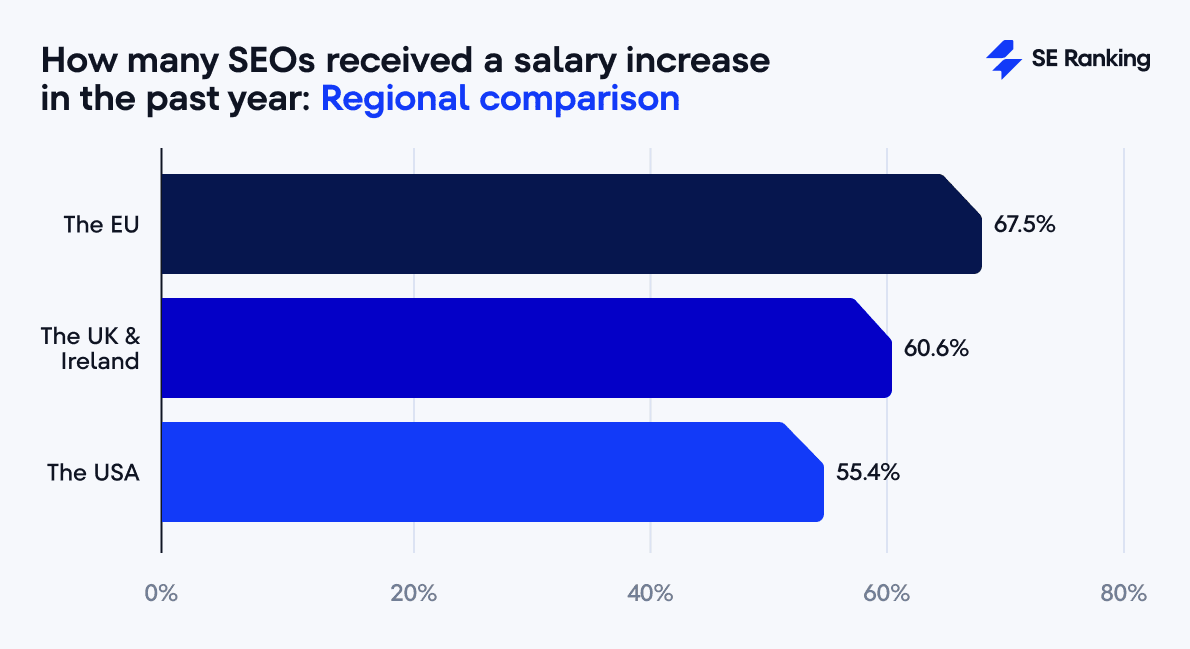
In the EU, 67.5% of SEO specialists received a raise in the past year, which is higher than both the UK & Ireland (60.6%) and the United States (55.4%).
Looking at the size of these raises, 43% of all respondents received increases of 1–10%. Notably, no one reported a raise over 30%.
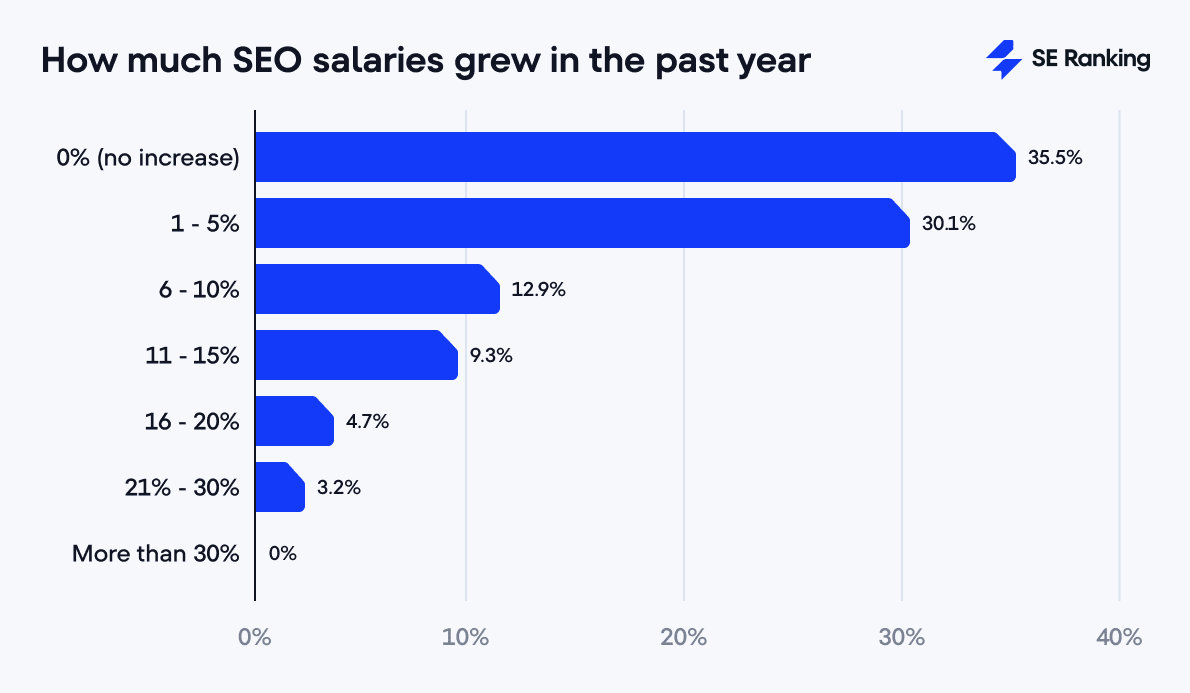
While a majority of SEO professionals did see their salaries increase last year, raises alone don’t seem to be enough to shift overall sentiment about pay. In fact, only 27% of SEO specialists say they’re satisfied with their income, believing it to be competitive. The remaining 73% either feel underpaid or remain uncertain about the competitiveness of their salaries.
Which skills and tasks lead to higher SEO salaries?
When it comes to top earners in SEO (those earning over $100,000), their daily work looks a bit different from the average specialist. SEO strategy and management clearly take center stage, with nearly 70% of high earners involved in this area (more than any other responsibility and noticeably higher than the overall average).
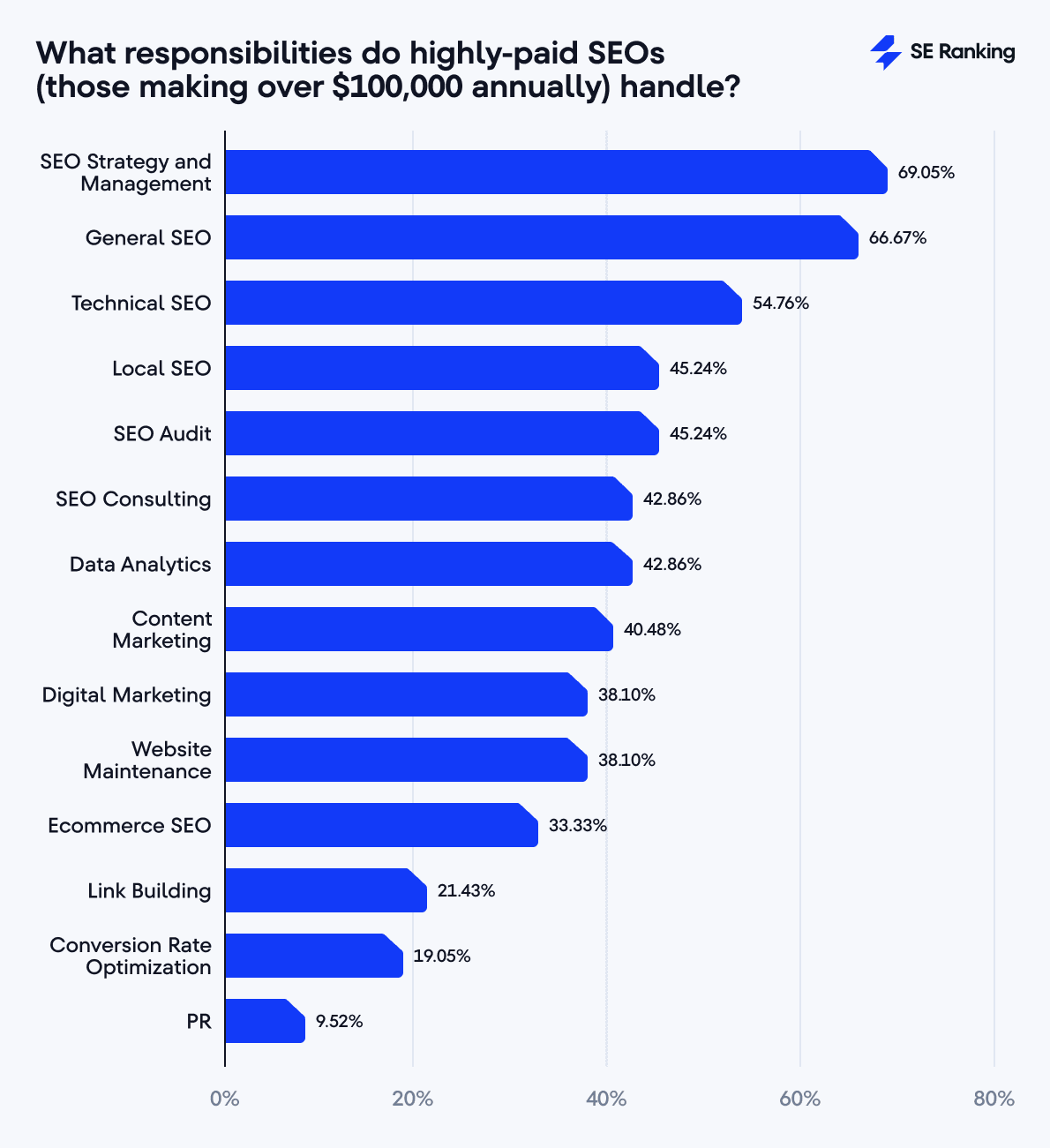
While general SEO tasks are still important (66.7%), their role seems to shrink slightly among higher-paid professionals. Instead, we see a shift toward specialized, high-impact work. For example, technical SEO, consulting, and data analytics are all more common among those earning six figures.
These areas likely contribute more directly to business outcomes, and that shows up in the paychecks.
SEO salaries by management duties
Also, climbing into the top salary bracket in SEO may involve taking on management responsibilities. The thing is, specialists with management duties earn a median salary of $73,880, which is 41.5% more than their counterparts without those responsibilities.
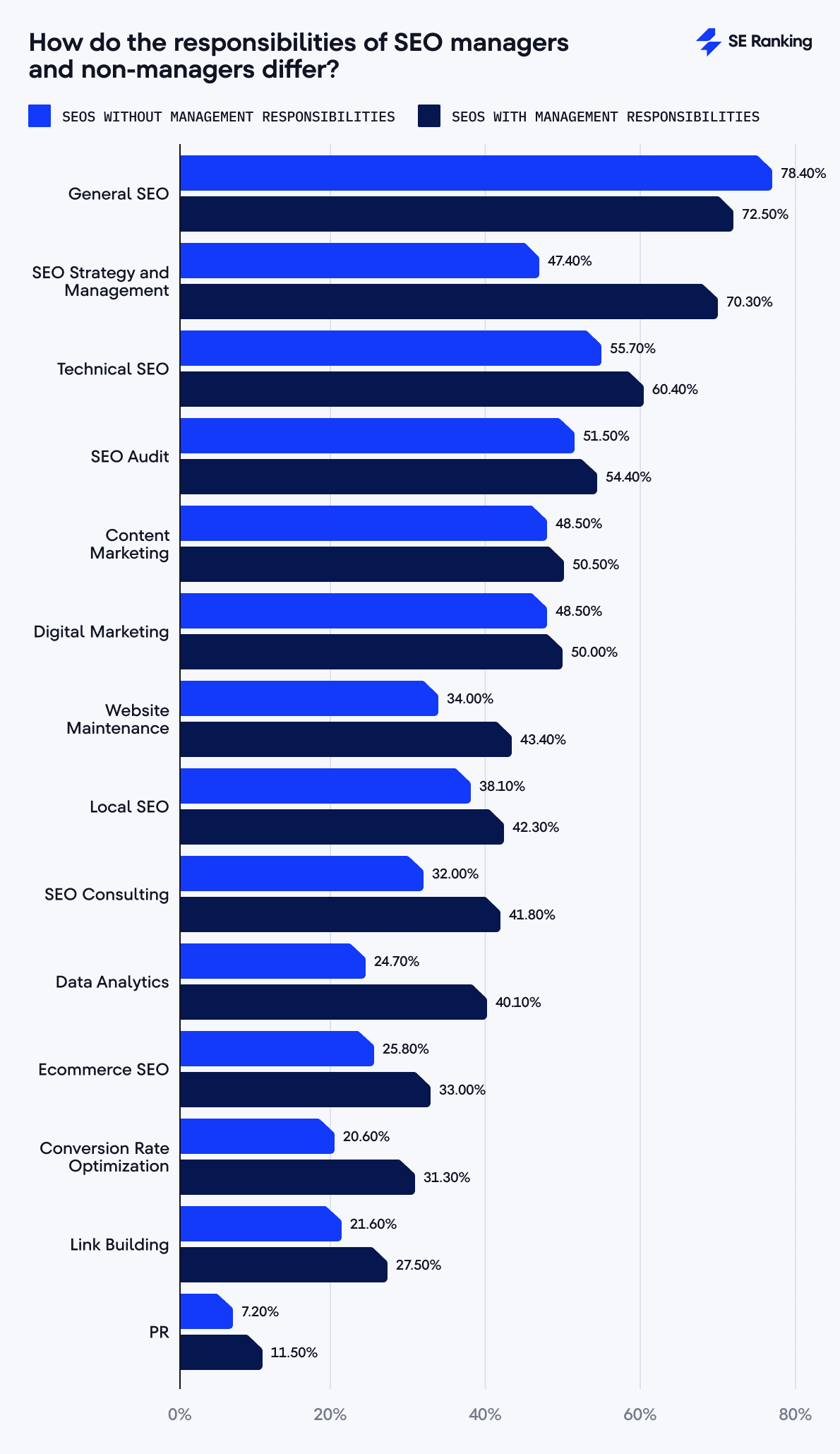
Still, keep in mind that extra pay comes at a cost: managers are 5.5x more likely to work over 50 hours a week and experience higher stress (3.35 vs. 2.97 points for specialists without management responsibilities).
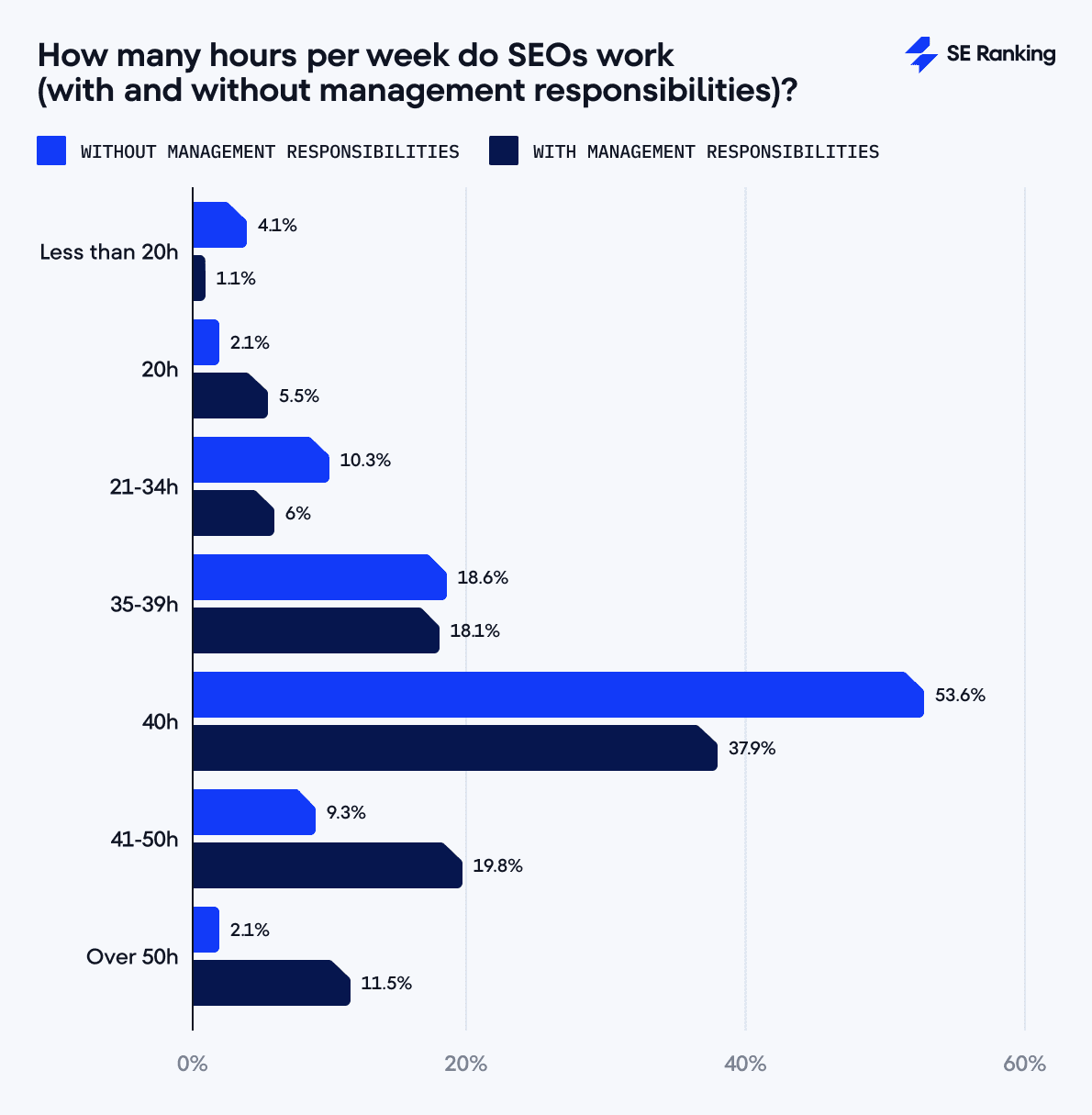
Final words
Overall, high earners in SEO aren’t doing anything magical; they often build smarter workflows that help them achieve more with less effort.
SE Ranking helps you do exactly that with intuitive SEO tracking and reporting tools. Here’s what the platform offers:
- A comprehensive toolkit to automate any SEO task, from keyword research and competitor analysis to technical SEO and backlink monitoring.
- AI Search Toolkit to track your presence, mentions, and competitors in Google’s AI Overviews, ChatGPT’s responses, and more.
- Reliable and continually expanding datasets, with ongoing upgrades to accuracy.
- Complimentary data migration when you opt for an annual plan.
- Pro and Business plans that come with 3 to 5 manager accounts included by default.
- Tiered pricing to accommodate different levels of data and user needs.

